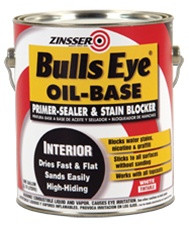Since 1982, professionals and do-it-yourselfers have relied on Bulls Eye 1-2-3® Primer-Sealer to quickly and effectively prime and seal a wide variety of interior and exterior surfaces: new drywall, wood, masonry, metal, glossy surfaces and more. Offering great adhesion without sanding, Bulls Eye 1-2-3 is a bond coatâprimer tha's great for hard-to-stick surfaces like old glossy paints and clear finishes, metal, fiberglass, PVC, composites& even glass & tile. Bulls Eye 1-2-3 is mold & mildew-resistant, so it's great for high-humidity areas like bathrooms and laundry rooms. It offers effective resistance to the formation of mold & mildew on the underside and surface of the primer film, prolonging the life of your paint job. It has a well-earned reputation as a great stain blocker, permanently and completely sealing stains from crayons, graffiti, greasy spots, tannin & even light water stains. Formulated with high performance proprietary resins, it is the "go to" primer for binding chalky surfaces like aluminum or previously painted siding and for priming possibly high pH surfaces like con-crete, stucco, plaster and fast setting joint & texture compounds. Bulls Eye 1-2-3 also inhibits rust formation when applied over clean ferrous metal such as iron and steel, eliminating the need for a separate, rust inhibitive primer. And, unlike other water-base primers, it dries to a smooth, tight film and resists flash rusting. Bulls Eye 1-2-3 inhibits long-term rust from developing under the primer film when dry, making it ideal for priming interior and exterior metalwork such as iron railings, steel doors and metal panels. With superior sealing qualities and great hold out, Bulls Eye 1-2-3 is also an outstanding base coat for any decorative painting or faux finish project & ragging, frottage, marbling, wood graining & even under metallic finishes. Bulls Eye 1-2-3 is ready to recoat in just 1 hour and can be tinted toward the color of your topcoat to eliminate the need for one coat of paint, saving both time and money.
SURFACE PREPARATION
Surfaces should be clean, dry, sound and free of dust, dirt,
excessive chalky material, grime, grease, oil, wax, mildew,
wallpaper, adhesive or any contamination that may
interfere with adhesion. If unsure of cleanliness, always
wash surface with an appropriate ammoniated cleaning
solution or solvent (do not use TSP as a cleaner). Remove
any peeling and/or unsound coatings. Sand any
remaining paint film edges smooth with the surface. Lightly
sand exposed exterior wood with 80 to 100 grit sandpaper
to remove loose or weathered wood fibers and mill glaze.
When priming over stained areas, first attempt to remove
as much of the stain as possible by washing, sanding,
scraping, etc. Bare wood that has been exposed for more
than 4 weeks should be lightly sanded or abraded to
remove weathered wood fibers. Remove exterior mold &
mildew with Zinsser Jomax® Mildew Killer and House
Cleaner. Remove interior mold and before painting with a
solution of one cup household bleach per gallon of water
or a quality mildew cleaner. Rinse well and allow surface
to dry completely before priming. Countersink exposed
nail heads, spot prime and fill all nail holes and gouges
with Zinsser Ready Patch®packling compound. Wire
brush rusty areas. Spot prime knots and sap streaks with
B-I-N® Primer-Sealer before whole surface priming with
Cover-Stain®High Base.
WARNING!
If you scrape, sand or remove old paint, you
may release lead dust. LEAD IS TOXIC. EXPOSURE TO
LEAD DUST CAN CAUSE SERIOUS ILLNESS, SUCH AS
BRAIN DAMAGE, ESPECIALLY IN CHILDREN.
PREGNANT WOMEN SHOULD ALSO AVOID
EXPOSURE. Wear a NIOSH-Approved respirator to
control lead exposure. Clean up carefully with a HEPA
vacuum and a wet mop. Before you start, find out how to
protect yourself and your family by contacting the National
Lead Information Hotline at 1-800-424-LEAD or log on to
www.epa.gov/lead.
MIXING
Brush Goods - Mix thoroughly to ensure any settled
pigment is re-dispersed. DO NOT THIN.
APPLICATION
Apply only when air, material, and surface temperatures
are between 50-90ºF (10-32ºC) and the surface
temperature is at least 5ºF (3ºC) above the dew point.
The relative humidity should not be greater than 85%.
Brush Goods - Mix thoroughly to ensure any settled
pigment is re-dispersed before using. In most cases only
one coat is necessary to prime most surfaces. If excessive
absorption occurs over very porous substrates a second
coat may be necessary. Spot priming is recommended
only under high-hiding topcoat paints. For best results,
prime entire surface before painting. Apply with a natural
or synthetic bristle brush, roller, pad or sprayer. Follow
manufacturer's instructions when using spray equipment.
Airless spraying - use a .017" tip at 2000 to 2500 psi.
Aerosol - Shake can vigorously for one minute after the
mixing ball begins to rattle. If mixing ball fails to rattle DO
NOT STRIKE CAN. Contact Rust-Oleum. Shake often
during use. Hold can upright 10-16†from surface and
spray in a steady back-and-forth motion, slightly
overlapping each stroke. Keep the can the same distance
from the surface. Keep the can in motion while spraying.
Apply two or more light coats a few minutes apart to avoid
drips and runs. Do not use near open flame.
CLEAN-UP
Brush Goods - Clean up spills and paint drips with warm
water and liquid detergent. Wipe up splatters before they
dry. Follow manufacturer’s directions to clean spray
equipment. Dispose of unused or unwanted product in
accordance with local laws regulating solvent-based
coatings.
Aerosol - Wipe off tip before storing. Clean-up wet paint
with xylene or mineral spirits. Properly discard empty
container. Do not burn or place in home trash compactor.
If the valve clogs, twist and pull off spray tip and rinse in a
solvent such as mineral spirits. Do not insert any object
into can valve opening.
Practical Coverage
Aerosol - 10-12 sq.ft./can(0.9-1.1 m2)
Brush Goods - 450 sq.ft./gal. (11.1m2/l) non-porous
350 sq.ft./gal. (8.6 m2/l) porous










